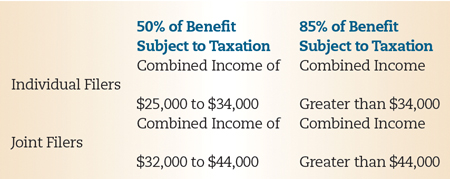Social Security: Five Facts You Need to Know

Social Security can be complicated—and as a result, many individuals don’t have a full understanding of the choices they may have.
1. Social Security Is a Critical Source of Retirement Income
Some have the perception that Social Security is of secondary or even tertiary importance in retirement. But according to a recent report by the Employee Benefits Research Institute, Social Security represents a major source of income for 67% of retirees.1 Keep in mind that Social Security makes annual cost-of-living adjustments (COLAs) based on the Consumer Price Index, and under current laws, pays income for life and the life of your spouse.2
2. You Can Choose When You Take Social Security
You have considerable flexibility regarding when you can begin receiving your benefits. You may begin receiving benefits as early as age 62; however, your benefits will be reduced at a rate of about one-half of 1% for each month you begin taking Social Security before your full retirement age.3 The full retirement age is 67 if you were born in 1960 or later. If you were born before 1960, your retirement age will be reduced depending on the year in which you were born.
You may choose to delay receiving benefits until after reaching your full retirement age; in which case, your benefits are scheduled to increase by 8% annually. This increase under current law will be automatically added each month from the moment you reach full retirement age until you start taking benefits or reach age 70 – the age at which these delayed retirement credits stop accruing. Plus, your benefit also will increase by any cost-of-living adjustments applied to benefit payment levels during that time.4
If you intend to continue working, you may still receive the full benefit for which you are eligible. Indeed, working beyond full retirement age can increase your benefits. However, your benefits will be reduced if your earnings exceed certain limits. If you work and start receiving benefits before full retirement age, your benefits will be reduced by $1 for every $2 in earnings above the prevailing annual limit ($22,320 in 2024).5
If you continue to work during the year in which you attain full retirement age, your benefits will be reduced by $1 for every $3 in earnings over a different annual limit ($59,520 in 2024) until the month you reach full retirement age.5
Once you have attained full retirement age, you can keep working, and your benefits under current law will not be reduced regardless of how much you earn.5 As you can see, the decision of when to begin taking Social Security is a critical one.
3. Social Security May Be Taxable
Depending on your income level, your Social Security benefit may be subject to taxation. The chart below illustrates how your combined income (adjusted gross income + your nontaxable interest + one-half of your Social Security benefit) can impact whether your Social Security retirement benefit is subject to taxation.6
Will Your Social Security Benefits Be Subject to Federal Income Taxes?
This potential income tax exposure may have substantial implications for whether you choose to work during retirement, how your assets are invested, and the timing of withdrawals from other retirement accounts.7,8 For instance, a withdrawal from a traditional IRA may lift your income beyond the thresholds described above, subjecting a higher proportion of your Social Security to income tax.7,8

The same is true of investment earnings in nonretirement savings. Retirees who have investment earnings in excess of their current spending needs may be subjecting their Social Security income to taxation. Shifting a portion of those assets to a tax-deferred instrument may be one way to manage taxation on your Social Security benefit.9
4. Social Security Can Be a Family Benefit
When you start receiving Social Security, other family members may also be eligible for payments. A spouse (even if they did not have earned income) qualifies for benefits if they are age 62 or older – or at any age if they are caring for your child. (The child must be younger than 16 or disabled.) Benefits may also be paid to your unmarried children if they are younger than 18, between 18 and 19 and enrolled in a secondary school as a full-time student, or age 18 or older and severely disabled.
Each family member may be eligible for a monthly benefit that is up to half of your retirement (or disability) benefit amount. There is a family limit, which varies, but is generally between 150% to 180% of your retirement (or disability) benefit.10 Should you die, your family may be eligible for benefits based on your work record.10
Family members who qualify for benefits include:
- A widow or widower
o age 60 or older;
o age 50 and older if disabled; or
o any age if they are caring for your child who is younger than 16 or disabled and entitled to Social Security benefits on your record.
- Unmarried children can receive benefits if they are:
o under 18 years of age;
o between 18 and 19 and are full-time students in a secondary school; or
o age 18 or older and severely disabled (the disability must have started before age 22).
Your survivors receive a percentage of your basic Social Security benefit – usually in the range of 75% to 100% for each member. However, the limit paid to each family is about 150% to 180% of your benefit rate.10
5. A Divorced Spouse May Be Eligible for Benefits
If you are divorced, you may qualify for Social Security benefits based on your ex-spouse’s work record. To be eligible for benefits, your ex-spouse must have reached the age at which they are eligible to begin receiving benefits (although they do not necessarily need to be receiving them).10
To qualify, you need to:
- have been married to your ex-spouse for at least 10 years;
- have been divorced for two years or longer;
- be at least 62 years old;
- be unmarried; and
- not be entitled to a higher Social Security benefit based on your own work history.
If your former spouse is deceased, you may still receive benefits as a surviving divorced spouse (irrespective of the age they died), assuming that your ex-spouse was entitled to Social Security benefits, your marriage was at least 10 years, you are at least 60 years old, and you are not entitled to a higher benefit amount based on your own work history. If you remarry before the age of 60, you will lose the ability to receive a survivor benefit from your deceased ex-spouse.10
If your former spouse is living, the maximum amount that you are eligible to receive is 50% of what your former spouse is due at full retirement age. To receive the maximum benefit, you will need to wait until you have reached your own full retirement age.10 Your benefits are unaffected should your former spouse elect to take Social Security before reaching full retirement age or if your ex-spouse starts a new family.10
For footnotes (1-10), please go to https://www. khabar.com/magazine/moneywise/
The content is developed from sources believed to be providing accurate information. The information in this material is not intended as tax or legal advice. It may not be used for the purpose of avoiding any federal tax penalties. Please consult legal or tax professionals for specific information regarding your individual situation. This material was developed and produced by FMG Suite to provide information on a topic that may be of interest. FMG Suite is not affiliated with the named broker-dealer, state- or SECregistered investment advisory firm. The opinions expressed and material provided are for general information, and should not be considered a solicitation for the purchase or sale of any security. Copyright FMG Suite.
 Moneywise is hosted by Rajesh Jyotishi with Shalin Financial Services, Inc. Moneywise is hosted by Rajesh Jyotishi with Shalin Financial Services, Inc. Rajesh Jyotishi is a registered representative of Dempsey Lord Smith, LLC, which is a registered broker-dealer and a member of FINRA/SIPC. Advisory Services are offered through Dempsey Lord Smith, LLC. Rajesh has been a resident of Atlanta since 1975 and in the financial services industry since 1991. For questions, he can be reached at 770-884-8175 or at RJ@shalinfinancial.com. |
Enjoyed reading Khabar magazine? Subscribe to Khabar and get a full digital copy of this Indian-American community magazine.
blog comments powered by Disqus










